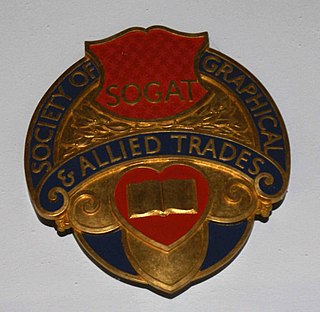Related Research Articles

The Society of Graphical and Allied Trades (SOGAT) was a British trade union in the printing industry.

The Modern Records Centre (MRC) is the specialist archive service of the University of Warwick in Coventry, England, located adjacent to the Central Campus Library. It was established in October 1973 and holds the world's largest archive collection on British industrial relations, as well as archives relating to many other aspects of British social, political and economic history.

Brenda Dean, Baroness Dean of Thornton-le-Fylde, was a British trade unionist and Labour Party politician. As general secretary of SOGAT from 1985 until 1991, she was "the first woman elected to head a major industrial trade union."

The National Union of Printing, Bookbinding and Paper Workers (NUPBPW) was a British trade union.
Richard William Briginshaw, Baron Briginshaw was a British trade union leader and politician.
The General Council of the Trades Union Congress is an elected body which is responsible for carrying out the policies agreed at the annual British Trade Union Congresses (TUC).

The Printing and Kindred Trades Federation (P&KTF) was a trade union federation in the United Kingdom.
William Herbert Keys was a British trade union leader.
E. W. Spackman, known as Bill Spackman, was a British trade unionist.
Clement James Bundock was a British trade union leader, newspaper editor and political activist.

The International Graphical Federation (IGF) was a global union federation bringing together unions of printing workers around the world.
Thomas James Smith was a British trade union leader.
Thomas George Newland was a British trade union leader.
The Bookbinders and Machine Rulers' Consolidated Union (B&MRCU) was a trade union representing people involved in the manufacturing of books in the United Kingdom.
Walter Clark Warren was a British trade union leader.
Henry R. King was a British trade union leader. He was a leading advocate for women's trade unionism who served for many years as treasurer of the London Trades Council.
The International Federation of Bookbinders and Kindred Trades was a global union federation representing unions of bookbinders.
Edward Nicholas Friend, also known as Teddy Friend, was a British trade union leader.
Friedrich Segessenmann was a Swiss trade union leader and politician.
Tony Burke is a British trade union leader.